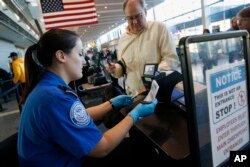Thursday is the sixth day of a partial U.S. government shutdown, and it is unlikely to be the day that brings a resolution in the standoff between President Donald Trump and Congress.
Trump has insisted on getting $5 billion in funding for a wall at the U.S.-Mexico border, while Democrats have objected and instead said they would agree to $1.3 billion in other border security spending.
In a Thursday morning tweet, Trump said "Have the Democrats finally realized that we desperately need Border Security and a Wall on the Southern Border." He also claimed most of the government workers not getting paid during the shutdown are "Democrats."
When asked Wednesday how long he thinks the shutdown will last, Trump told reporters, “Whatever it takes.”
“I mean, we’re going to have a wall. We’re going to have safety.”
He declined to comment about the prospect of backing away from his demand for $5 billion in wall funding and instead accepting the lower figure for border security.
Democratic leaders in Congress have blamed Trump for “plunging the country into chaos.”
“The president wanted the shutdown, but seems not to know how to get himself out of it,” Senator Minority Leader Chuck Schumer and incoming House speaker Nancy Pelosi wrote in a joint statement.”
Whatever the solution the two sides eventually find to fund about one-quarter of the government it will have to be approved by both houses of Congress and signed by Trump.
No votes Thursday
Republican leaders in the House of Representatives told members not to expect any votes Thursday, and that they would be given 24 hours’ notice before any votes take place. Many lawmakers went home this week for the Christmas holiday.
In the Senate, the chamber’s calendar says it will reconvene Thursday for discussion of the spending issue, but how many members will be present remains to be seen.
Perhaps further complicating the ongoing discussions is that currently Republicans hold majorities in both the House and Senate, but in one week Democrats will take over in the House while Republicans will add a few seats to their Senate advantage.
800,000 workers affected
The shutdown is affecting about 800,000 federal workers. About half of them are going to work but will not be paid until the shutdown is over. The rest are at home waiting to find out if Congress will follow what it has done in the past and approve pay for them as well.
Trump said Monday he has the backing of federal workers and that they want him to stick to his demand for the wall funding.
The American Federation of Government Employees, the largest union of U.S. federal workers, rejected that statement Wednesday.
“They are eager to get back to work. They unequivocally oppose using shutdowns as a means of resolving policy disputes,” AFGE National President J. David Cox Sr. said. “This is not about a wall, this is about 800,000 real people with real families and real bills to pay.”
AFGE membership includes some Voice of America employees.
White House Council of Economic Advisers Chairman Kevin Hassett said the shutdown is merely a temporary problem for affected federal employees.
“They might miss a pay period because the government shut down,” Hassett told reporters Wednesday. “But in the end, even if they aren’t working, then Congress has decided to pay people for the whole time. So in the end, it’s really just a sort of short-term problem not a long-term problem for government workers.”


































